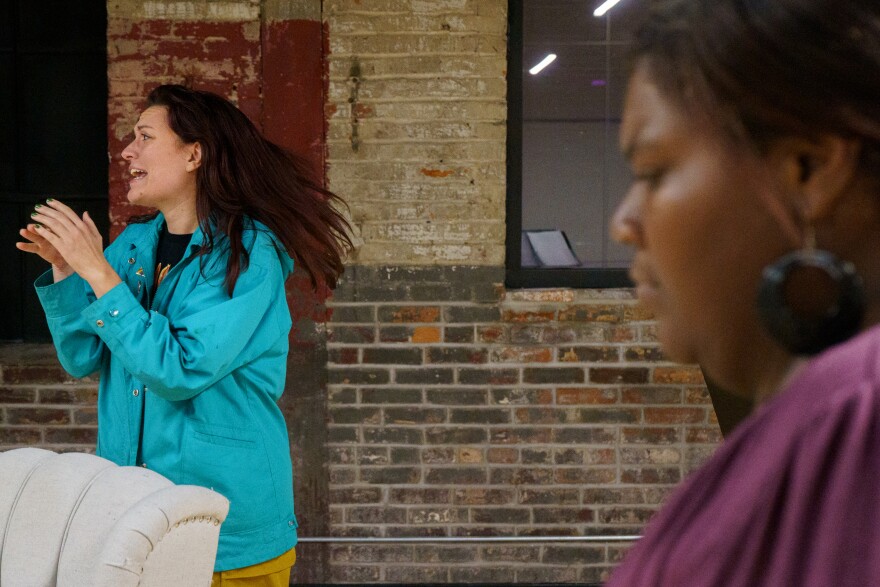There’s a moment in the play when the main character, Kate, thinks about everything a friend doing life in prison may not be able to see or feel again: fresh grass beneath her feet, a hug from a family member and a sunset.
Her monologue is a powerful moment in Prison Performing Arts’ “Don’t Be a Hero, Thank You,” and it also grapples with the changes that come with being away for years from home.
“Everything has changed around you. The people around you have changed,” said the actress who plays Kate. “People are different, people have grown, people have left, and you’re trying to be this new person in a new world, and no one sees you as that person.”
LaWanda Jackson, a formerly incarcerated actress, plays Kate. It’s a role that resonates with her and one she hopes former detainees and those who can’t leave prison can relate to.
For 25 years, Prison Performing Arts and its alumni organization have brought performances like Jackson’s to life with productions that allow former detainees to shine on and behind the stage in Missouri prisons. On Thursday, two playwrights open shows on the theme of home at Greenfinch Theater & Dive that run through Nov. 17.
Sophie Proe
/
St. Louis Public Radio
Playwright Katie Leemon wrote “Don’t Be a Hero, Thank You” about a woman who returns home after a decade in prison. Leemon based it on her own journey after being incarcerated for bank robbery. In prison, her love for theater grew.
“I thought my life was over, “ Leemon said. “They had programs and things in there like PPA, and you start piece by piece doing self-discovery archeology.”
Leemon acted in several productions, including “Animal Farm” and “The Tempest.” Her love for theater continued after she was released in 2021, and she joined the Prison Performing Arts alumni association.
The association was founded in 2005 to help people continue their artistic journey when they come home and form a community. Connections between former detainees have continued to flourish between actors and playwrights with many working together again, stage director Rachel Tibbetts said.
“We often see folks who maybe would never engage with each other, maybe come together and make a play together and realize that they have a lot more in common than they think,” Tibbetts said. “Also their differences are something that they can learn from each other. It’s really beautiful to be able to witness that.”
Working through sensitive topics and experiences presents a unique challenge, Tibbetts said. You have to be authentic while not indulging in trauma. To accomplish this, actors and playwrights engage in intimacy work.
“Don’t Be a Hero, Thank You” includes humorous moments, like when the character Kate describes what it’s like to exert her femininity in prison and how women are often given men’s clothing and then have to adjust to look and feel more womanly. It’s one of many moments that provides relief from the serious topics.
Leemon describes the play as “prison adjacent,” since so much of the production focuses on the aftermath, womanhood and what it’s like for formerly incarcerated people to return home.
Home is also the central theme of “Go Before I Do,” which is loosely based on playwright Hazel McIntire’s experiences. Unlike “Don’t Be a Hero, Thank You,” the play isn’t about incarceration.
But it taps into skills she fostered while spending two years in prison for writing fake checks. While there, McIntire furthered her acting and writing experience through the theater program.
Sophie Proe
“It didn’t teach me how to act. It didn’t teach me how to write,” McIntire said. “What it did was empower me so that I was able to speak.”
“Go Before I Do” is her first produced play. She wrote it after moving to upstate New York during the early days of the coronavirus pandemic.
The play is about a woman from a small town who tries reconciling with her dad at a bar after years apart and the death of her mother. It taps into the time McIntire missed and the moments she wasn’t able to experience in her hometown of Van Buren, Missouri, and her struggle to return.
“Nothing travels faster in a small town than gossip, and hurt feelings stay a long time,” McIntire said. “I had just blocked off where I grew up and kind of written off a whole portion of my life, which is unfair.”
There are hyperspecific details that will resonate with audiences. Names of people who have died are there to show the power a small town has and the hold those memories have.
But like Leemon’s play, McIntire’s play is also meant to resonate with anyone reckoning with the community that made them while embracing the joy and pain that inevitably comes with home.
“For those that are leaving home, it might not have been great, but those people shaped you,” McIntire said. “And shaping can come in good and bad, but we got to hold on to that.”


